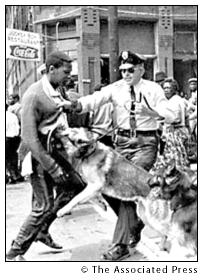What is Race? What is Racism?
Original Usage:
A People Different from Us (usually inferior) based either on culture practice, wealth, technological advancement, religion, examples: Romans v. Barbarians, English v. the Irish. Often rooted in Christian views that Moors and Jews as infidels who are not only damned but morally and culturally inferior.
In this sense, the concept of race has always contained the concept of innate differences, though based not on modern concepts of biological determinism, but on the belief that cultural and (visible) physical are determinative of individual behaviors and capacities.
Thus, the concept of race gave powerful nations and empires (Romans, the British, etc.) to draw a boundary between civilization and savagery, between those whose humanity must be recognized and those who can be seen as part of the natural, rather than the human, world.
The Chicken or the Egg Question: Which Came First
Was the association of race with skin color a product of the slave trade and colonialism (i.e. were racial ideologies that stigmatized blackness and African peoples developed in order to justify slavery)? Or, as historian Winthrop Jordan has argued, did European plantation owners and slave traders turn to African slaves because the link between blackness and both inferiority and evil was already well-established in European cultures?
The word "slavery" is actually derived from "slavs" as slavic peoples were the most common victims of the ancient Greek and Roman slave trades. Plantation slavery itself did not emerge as way to maximize profits from market-based agriculture until the three centuries following 1000 A.D. in the eastern Mediterranean (in the current borderlands between Syria and Turkey).
From there, plantation slavery moved west across the Mediterranean over the following centuries, eventually to the Canary, Azore, and Verdean islands west of the European and African and from there to the western hemisphere. And in the process, slavers increasingly turned to Africa (initially through the Arab-African slave trade) for the plantation labor force. Again, was this because Europeans saw blacks as cognitively and culturally inferior? Or did the idea of black racial inferiority develop to justify the decision to enslave infidel blacks whose resistance to tropical diseases made them ideal workers on sugar plantations in equatorial regions.
How Did Race Become a Scientific Idea?
In the period known as the (European) Enlightenment, many intellectuals turned their efforts to finding natural (i.e. biological) rather than religious and moral explanations for the differences between human groups (both within Europe and between Europeans and peoples from elsewhere around the globe). Many came to see racial differences as analagous to species differeniation and thus turned to system of plant and animal species classification developed by Linneaus even though Linneaus based his work on the theory that the way to tell if two animals or plants were from different species or no was whether they were physically able to procreate new life.
The influence of Linneaus' theory can be seen in Thomas Jefferson’s thinking on race? While Jefferson was opposed to slavery, he did believe that there were biological differences between the races and that blacks were not just culturally but also biologically inferior to whites. What difference does it make if those differences are biological/natural (in Jefferson’s mind, the biological, cognitive, and moral are wrapped up together) rather than cultural?
Most influential in the development of a scientific (biological) theory of race was Charles Darwin's concept of evolution-- that species differeniation is a result of a natural process of genetic mutation, in which successful mutations are those that enable a set of individual species members to increase their numbers over the course of multiple generations. Eventually, this mutation process produces different species as defined by Linneaus . In other words, those species that survive and prosper over generational time can be seen as benefiting from mutations that made them the most fit for survival (i.e. the survival of the fittest.
Quickly, Darwin's theory of species differeniation initiated a key shift in racial thinking. Now racial differences could be seen as proven by scientific method and thus based in nature, not just human theorizing. Races can now been seen by those seeking to enforce racial separation and systems of racial dominance as comparable to or at least moving towards separate species.
If drawing a boundary between civilization and savagery is to draw a boundary between those whose humanity must be recognized and those who can be seen as part of the natural, rather than the human, world, then to say that differences between human groups are racial became a way to view those differences as immutable, unchangeable, and determined by nature rather than as a product of human action and decision-making.
Modern Critiques of Race Science:
Current critiques of race science come from two sources 1) genetic research and 2) work in the social sciences, humanities, and public policy.
Geneticists largely agree on the following points:

The Social Construction of Race-- Built by Humans
More broadly, specialists on race and race relations have come to see the concept of race as a social construction rather than as a scientific truth. In other words, human societies have developed the idea of race in order to explain differences between human populations (races) and to justify social systems based on racial exploitation and racial hierarchies.
But how do critics of race as biology explain differences in disease patterns? Are they explained by differences in environment, behavior, and/or invisible biases in medical care and research? Or do the suggest that there are important differences in genetics that in the current political and cultural environment are being overlooked?
Beverly Tatum, Why Do All the Black Kids Sit Together in the Cafeteria?

Why talk about racism? What is Tatum’s purpose in writing the book? What is her argument? Do you agree that racism is a current rather than a past issue? Do you agree that racial separation is still a problem in out society?
Omi and Winant's theory of Racial Formation Will Be Discussed in a Later Lecture.